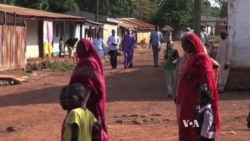BODA, CENTRAL AFRICAN REPUBLIC —
In western Central African Republic, entire towns have been emptied of Muslims. Some have been killed, while thousands of others have fled the anti-balaka militia who attacked them earlier this year as Muslim Seleka rebels withdrew to the northeast. In the southwestern town of Boda, thousands of Muslims are trapped as international troops struggle to keep a lid on tensions.
There is an invisible wall now dividing the town of Boda. One Muslim man was shot when he ventured across it two days ago.
On one side is the town's Muslim population. On the other is the Christian population, including the mostly Christian anti-balaka militia.
Increased violence, failed talks
Each side says the other started the fighting. It began January 29 after the Muslim Seleka rebels left town. Dialogue has failed.
Violence only eased when French troops established this border.
They call it the "red line." Only it's not really a line. It's a circle surrounded by anti-balaka. Boda's mayor, Mahamat Awal, a Muslim, draws a map.
"This goes to Bangui. We can't cross this bridge. And we can't go here. We stay only in this district," he said.
Pervasive hunger
Hunger is the top concern. Muslims can't get to the market. They say the anti-balaka won't let Christian merchants come and sell food to them.
"No medicine, no security, said Boda resident Mahamat Kamiss Abouda. "The anti-balaka, they are killing. There is no food. Every day, every day, it's to the cemetery. Every day we need fabric to wrap bodies."
Clashes continue in the bush. Muslims have been fleeing into town. Another man said he walked 40 kilometers after being the sole survivor of an anti-balaka attack that killed 20 people, including his two wives and five children.
African Union peacekeepers from the Republic of Congo deployed to Boda at the end of March.
Their commander, Captain Ghislaine Singui, called a meeting on the Christian side. He said his orders are to keep the peace. "Those who hurt the population, I will hunt them even if they go into the bush. I have the men and the equipment for that."
The chief of the anti-balaka in Boda, Dopani Firmin, has a simple message. "The Muslims must go. That is the only solution," he said.
Locals get up to talk. They thank the anti-balaka and they repeat, "The Muslims must go."
Back in the Muslim neighborhood, some see economic reasons for this surge of resentment. Muslims control much of the commerce in Boda, including the gold and diamond trade.
Some worry their homes and businesses will be destroyed if they leave. Still, many say they'd go if they could.
There is an invisible wall now dividing the town of Boda. One Muslim man was shot when he ventured across it two days ago.
On one side is the town's Muslim population. On the other is the Christian population, including the mostly Christian anti-balaka militia.
Increased violence, failed talks
Each side says the other started the fighting. It began January 29 after the Muslim Seleka rebels left town. Dialogue has failed.
Violence only eased when French troops established this border.
They call it the "red line." Only it's not really a line. It's a circle surrounded by anti-balaka. Boda's mayor, Mahamat Awal, a Muslim, draws a map.
"This goes to Bangui. We can't cross this bridge. And we can't go here. We stay only in this district," he said.
Pervasive hunger
Hunger is the top concern. Muslims can't get to the market. They say the anti-balaka won't let Christian merchants come and sell food to them.
"No medicine, no security, said Boda resident Mahamat Kamiss Abouda. "The anti-balaka, they are killing. There is no food. Every day, every day, it's to the cemetery. Every day we need fabric to wrap bodies."
Clashes continue in the bush. Muslims have been fleeing into town. Another man said he walked 40 kilometers after being the sole survivor of an anti-balaka attack that killed 20 people, including his two wives and five children.
African Union peacekeepers from the Republic of Congo deployed to Boda at the end of March.
Their commander, Captain Ghislaine Singui, called a meeting on the Christian side. He said his orders are to keep the peace. "Those who hurt the population, I will hunt them even if they go into the bush. I have the men and the equipment for that."
The chief of the anti-balaka in Boda, Dopani Firmin, has a simple message. "The Muslims must go. That is the only solution," he said.
Locals get up to talk. They thank the anti-balaka and they repeat, "The Muslims must go."
Back in the Muslim neighborhood, some see economic reasons for this surge of resentment. Muslims control much of the commerce in Boda, including the gold and diamond trade.
Some worry their homes and businesses will be destroyed if they leave. Still, many say they'd go if they could.





